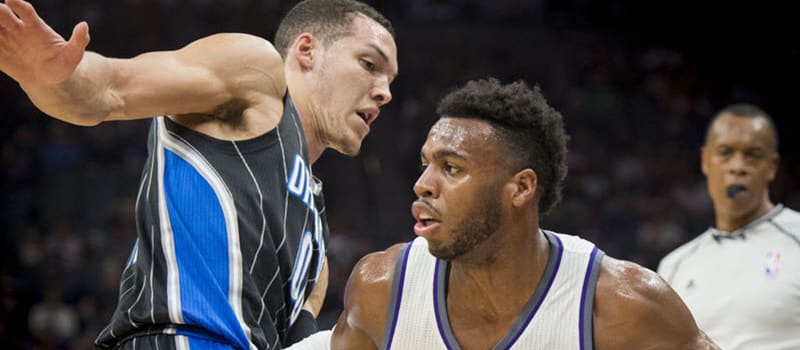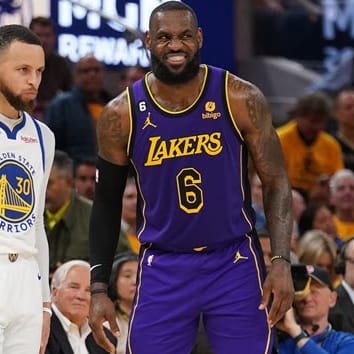This article is part of our Season Review series.
There are four teams still in title contention. But for most teams, we can recap the 2017-18 season, looking back at what went right, what went wrong, and what the future holds.
As we continue to work our way through the league from the bottom up, the Hawks, Magic and Kings are up next.
 ATLANTA HAWKS
ATLANTA HAWKS
The Good
If you define a successful tank and rebuild by the quantity of young players to see the floor, then the Hawks exceeded expectations. Aside from the core of Dennis Schroder, Taurean Prince and John Collins, a combination of Tyler Dorsey, DeAndre' Bembry, Tyler Cavanaugh, Isaiah Taylor and Damion Lee played a total of 3,518 minutes. That's a lot of minutes.. And for what it's worth, Isaiah Taylor led the team in +/- per 100 possessions (+5.4) among players who saw at least 1,000 minutes.
Collins, the 19th overall pick in last year's draft, didn't play as much as most fantasy owners would have liked, especially considering the state of the team. However, Collins still averaged a solid 24.1 minutes per game, putting up 10.5 points, 7.3 boards and 1.1 blocks while spending 60 percent of his minutes at power forward and 38 percent of his minutes at center (and two percent of his minutes at small forward, which I'm not convinced actually happened). He probably still needs to add more size to play center and/or extend his range to play more power forward (16-of-47 3PT), but it appears the Hawks have secured a frontcourt piece for the future.
While Prince struggled with consistency, he significantly improved his shooting, drilling 2.1 threes per game at s 38.5 percent clip, compared to last season's 0.6 threes per contest at 32.4 percent. In the process, the 12th overall pick in 2016 showed his potential to be a starting-caliber three-and-D wing at just 24 years old. Prince closed the season with healthy averages of 14.1 points, 4.7 rebounds, 2.6 assists and a combined 1.5 steals/blocks across 30.0 minutes.
The Bad
In hindsight, asking Dennis Schroder to be the No. 1 option may have been asking a little too much of the fifth-year guard, who had the likes of Paul Millsap, Dwight Howard, Kyle Korver, Tim Hardaway and others to defer to a year ago. Schroder posted a sub-par 2.3:1 assist-to-turnover ratio, while shooting just 43.6 percent from the field and 29.0 percent from three on 3.9 attempts per game. While his career free-throw percentage of 82.7 percent suggests he can turn into a solid shooter from distance, firing away at that volume isn't his game -- at least not right now. At 24-years-old, Schroder has time to continue his development, but it might be hard to gauge his true value to the franchise until they get a better supporting cast. The infusion of likely top-five pick in the draft should help, but barring an unforeseen free agency splash, Atlanta is still at least a few more years away from playoff contention.
State of the Franchise
Aside from paying former Bucks great Miles Plumlee a guaranteed $25 million over the next two seasons to simply not have Dwight Howard on the roster anymore, the Hawks are actually in a good place financially and enter Tuesday's lottery with the fourth-best odds at the No. 1 pick after losing a tiebreaker to the Mavericks. They have Schroder at fairly palatable $15.5 million/year over the next three seasons, while Prince and Collins are still on their rookie deals. The odd man out may be Kent Bazemore, who will be 29 by the time next season rolls around and is making $18.1 million next year and has a $19.3 million player option for 2019-20, which he'll almost certainly pick up. That might be a hard contract to move, but it wouldn't surprise me if a fringe playoff team took the risk on a two-way wing with range, even if his development seems to have stalled.
 ORLANDO MAGIC
ORLANDO MAGIC
The Good
The rebuild has been happening since 2012, and it seems Orlando finally found a player to build around in Aaron Gordon, who's a restricted free agent this summer. The Magic also believe they hit on Jonathan Isaac with the No. 6 pick in last year's draft, but the jury is still out after ankle injuries limited the rookie to just 27 games.
Gordon also battled through injuries this season, playing just 58 games but demonstrating across-the-board improvement. The Arizona product boosted his three-point percentage up to 33.6 percent ( up from last season's 28.8 percent), allowing Frank Vogel to use him as a more traditional stretch-four. His athleticism allows him to put the ball on the deck and finish at the rim, as well. When both aspects of his game are firing, Gordon becomes hard to stop. He recorded three games this season of at least 39 points, each of which came before the calendar turned to 2018. Gordon hit better than 41 percent of his threes through the first three months of the season (28 games), but his shooting tailed off considerably in the second half. From Jan. 1 on (30 games), Gordon converted a Marcus Smart-esque 27.3 percent of his three-point looks.
When Isaac did play, the rookie looked as good as advertised on defense, averaging 2.2 steals and 2.0 blocks per 36 minutes. He also held the team's best Defensive Net Rating at 101.1. With that side of the ball sorted out, the Magic will look to develop Isaac offensively, where he struggled to pick his spots. Isaac shot just 37.9 percent from the field, though managed to go 16-of-46 (34.8 percent) from beyond the arc -- coincidentally, the exact same percentage he shot as a freshman at Florida State.
The Bad
Elfrid Payton never turned the corner. Orlando traded up to spend a top-10 pick on Payton in 2014 and subsequently started him for 234 of his 281 appearances in a Magic uniform. He ended his tenure with averages of 11.2 points, 6.4 assists and 1.3 steals per game with a subpar 49.9 true shooting percentage. While he managed to shoot 52.0 percent from the field and 37.3 percent from beyond the arc prior to being dealt to Phoenix, Payton's 63.2 percent mark from the free-throw line remained a cause for concern. Ultimately, Orlando decided he didn't have the upside, even as a passer or defender, to warrant a contract extension this summer.
State of the Franchise
It feels like there are two different teams here. Nikola Vucevic, Terrence Ross, D.J. Augustin, Jonathon Simmons and Shelvin Mack have an average age of 28.2 and are guaranteed a combined $42.6 million next year, with only Vucevic being able to pass for more than a role player on a playoff-caliber team. And for a team that's won fewer than 30 games in five of the last six seasons, the Magic have very little to show for it. Gordon and Isaac are nice pieces, but they'll have to pay up to keep Gordon this summer, while Isaac's 27-game sample is too small to draw any real conclusions. Orlando has a productive wing in 25-year-old Evan Fournier, but he, too, battled injuries this season and could be off the books by the time the Magic are a viable playoff contender.
Wesley Iwundu and Khem Birch also saw a disturbing amount of minutes, but it's still very much unclear if either will develop into anything more than fringe-rotation players.
 SACRAMENTO KINGS
SACRAMENTO KINGS
The Good
For the first time in a while, there's legitimately something to like about most of the Kings' young core.
It's become increasingly clear that Buddy Hield may not, in fact, be the next Steph Curry, but he managed to shoot 43.1 percent from three on 5.1 attempts per game and averaged 19.1 points and 1.5 steals per 36 minutes in his first full season with the Kings. Willie Cauley-Stein hasn't made any massive leaps, but has improved in each of his three NBA seasons. Cauley-Stein averaged 16.4 points, 9.0 rebounds, 3.0 assists and a combined 2.6 steals/blocks per-36 minutes, while shooting 50.2 percent from the field. Rookie Bogdan Bogdanovic quickly adjusted to the NBA game, shooting 39.2 percent from three and racking up 4.3 assists per 36 minutes, often looking like the better player than fifth overall pick, De'Aaron Fox
The Bad
This is going to sound crazy, but bringing in 36-year-old Zach Randolph and 41-year-old Vince Carter in free agency didn't solve the Kings' problems. At best, both players ate up minutes on the road to another high-lottery pick. At worst, playing them ahead of younger players may have stunted development. The truth is probably somewhere in the middle, but 10 months later, the singings remain as puzzling as they were in July. I don't want to completely write off the importance of veteran presences on a developing team, but short-sighted moves like these are a major part of the reason the Kings haven't sniffed the playoffs since the days of Brad Miller.
Another disappointment was the lack of development from Skal Labissiere. Coming off an impressive rookie year, Labissiere spent much of the season buried beneath Cauley-Stein, Randolph and Kosta Koufos on the depth chart. He played in 60 games but regressed across the board with his field goal percentage (44.8% FG) falling off a cliff.
Finally, if we're nitpicking, De'Aaron Fox wasn't quite the two-way dynamo as a rookie that he was at Kentucky. For the most part, he struggled where we thought he'd struggle and excelled where we thought he'd excel. Managing to keep his field goal percentage north of 41 percent was encouraging, though Fox hit only 31 percent of his threes and 72 percent of his free throws. Fox didn't have a bad rookie season, but if we re-did the 2017 draft, he'd go a handful of spots lower.
State of the Franchise
Unlike the Magic and the Hawks, the Kings have a decent young nucleus to build around. Had it not been for the inexplicable decision to sign a bunch of past-their-prime veterans, Sacramento would have been able to put together a rotation of developing, meaningful players who could have seen big minutes and lost just as many games. And even though not a single player cracked 30 minutes per game, we still got a peek at the long-term potential. While next season will likely bring another trip to the lottery, Randolph, Iman Shumpert, Kosta Koufos and Garrett Temple will all be expiring contracts, giving the club plenty of financial flexibility for the summer of 2019.
The much bigger question is whether Sacramento will be an attractive free agent destination. Smart money says no, and the Kings forking over their -- take a deep breath -- UNPROTECTED 2019 first-rounder, which could very well land in the top-three, will be another blow to the rebuilding effort. The Kings won't have a reason to lose 50-plus games next season, but unless they strike gold in next month's draft, they probably won't have a choice












